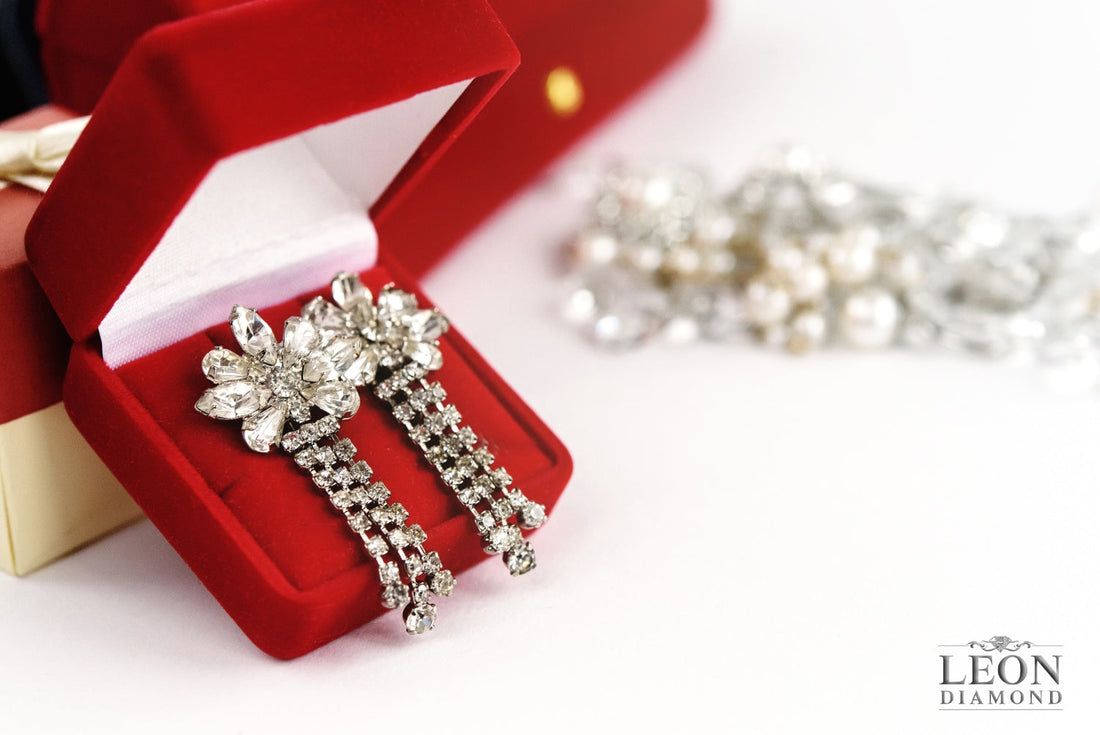
Understanding Warranties and Guarantees for Fine Diamond Jewelry
Share
Buying fine diamond jewelry comes with excitement but also risk. Many buyers assume that a high price means lifelong protection. It doesn't. Without a clear warranty or guarantee, you may face high repair costs, loose stones, or metal failure without recourse. To protect your investment, you need to understand exactly what warranties and guarantees cover and what they don't.
Let's explain how jewelry warranties work, what terms to look for, and which protections truly matter when investing in diamond pieces.
What Is a Jewelry Warranty?
A diamond jewelry warranty is a written promise from the retailer or manufacturer to repair, replace, or maintain a piece under specific conditions. Common coverage includes:
- Free prong tightening
- Re-polishing and cleaning
- Metal re-rhodium plating
- Stone tightening and resetting
- Inspections for structural wear
These warranties often exclude accidental damage, theft, loss, and neglect.
What Is a Jewelry Guarantee?
A guarantee is a retailer's or brand's assurance about the quality and authenticity of the product. Unlike a warranty, it focuses not on repairs but on the original craftsmanship. Key aspects of guarantees:
- Authentic diamond certification
- Conflict-free diamond assurance
- Lifetime trade-in or upgrade options
- Manufacturing defect protection
Guarantees typically apply at the time of sale and may not cover future repairs unless specifically stated.
What's the Difference Between a Warranty and a Guarantee?

When purchasing valuable products or services, understanding your protection options helps you make informed decisions and buy with confidence. While warranties and guarantees both provide peace of mind, they serve distinct purposes. A warranty primarily ensures ongoing service and maintenance, whereas a guarantee underscores product quality and authenticity. Knowing the differences can save you from unexpected hassles down the road.
Here's a simple breakdown to help you understand warranties and guarantees clearly:
|
Feature |
Warranty |
Guarantee |
|
Purpose |
Covers repairs, wear, and upkeep |
Confirms quality and authenticity |
|
Duration |
Time-limited (1 year to lifetime) |
Often lifetime |
|
Activation |
May require registration |
Automatically applies upon purchase |
|
Transferability |
Rarely transferable |
Often tied to the original buyer |
|
Covers Accidents |
No |
No |
A warranty is service-focused; a guarantee is value-focused.
What Do Lifetime Warranties Cover?
Lifetime warranties sound reassuring, but they often come with strict conditions. Typical coverage includes
- Annual free inspection
- Prong repair or tightening
- Complimentary cleaning
- Stone tightening
- Metal re-coating (for white gold)
Common exclusions:
- Lost or stolen items
- Accidental damage
- Third-party repairs
- Normal wear beyond certain thresholds
Always check the fine print. Some warranties become void if you miss an annual inspection.
Do All Diamond Jewelers Offer Warranties?
No. Warranties vary widely between brands.
Major differences:
- Luxury brands like Tiffany & Co. offer limited service warranties.
- Online retailers often offer extended warranties with registration.
- Independent jewelers may include in-house coverage only.
You should always request the written warranty terms before making a purchase.
Should You Buy an Extended Warranty?
Extended warranties can be worthwhile, depending on the value and usage of the jewelry. It makes sense when:
- For high-carat diamond rings
- For pieces worn daily (e.g., engagement rings)
- When lifetime cleaning and inspections are included
- When upgrades or resizing are covered
Check if the plan covers accidental damage, not just defects.
What Are Common Warranty Requirements?
To keep the warranty valid, you must follow certain rules. Most include:
- Annual inspections by the original jeweler
- No third-party repairs
- Original purchase documents kept safe
- Proper storage and handling of the jewelry
Missed inspections or lost paperwork may void the warranty. Always follow care instructions.
Are Online Diamond Purchases Covered?
Yes, but policies differ between sellers. Trusted online jewelers offer:
- Return guarantees (30–60 days)
- Free resizing periods (often 1 year)
- Lifetime maintenance services with proof of purchase
- Free repairs for defects in craftsmanship
Always read the returns, warranty, and service terms before checkout.
How Do Guarantees Work for Custom Jewelry?

Custom-made jewelry typically includes the manufacturer's guarantees but may lack broader warranties. It often included:
- Guarantee against design flaws
- Certification for custom diamonds
- Sizing or fitting adjustments
- Polishing and finishing quality assurance
However, custom pieces may have limited return or repair options, especially for bespoke settings.
Can You Transfer a Jewelry Warranty?
Most jewelry warranties are non-transferable, especially from private sellers. Some of the exceptions are
- Some luxury brands allow limited transfer if the item is re-registered.
- Pre-owned items with transferable service plans are rare and require documentation.
Always confirm whether the warranty stays with the piece or the buyer.
What's Typically Excluded in Warranties?
Not all damage is covered. Most warranties exclude:
- Theft or loss
- Chips or cracks from dropping
- Exposure to chemicals or extreme heat
- DIY cleaning or resizing
- Neglect or improper storage
These exclusions make jewelry insurance an important complement to your warranty.
Should You Get Jewelry Insurance If You Have a Warranty?
Yes. A warranty only covers maintenance, not theft or loss. Insurance provides:
- Replacement value for stolen or lost items
- Coverage for damage from accidents
- Worldwide protection
- Flexible policy limits
Pairing insurance and a warranty gives complete peace of mind.
How to Check a Jewelry Warranty Before Buying?
Always ask the jeweler the following:
- Is the warranty written and included in the purchase?
- Are inspections required to maintain it?
- Does it cover accidental damage or loss?
- Can I use third-party repairs?
- What happens if I miss a checkup?
Request a copy of the full warranty terms before finalizing your purchase.
What Documents Should You Keep for Warranty Validation?
You must store the original paperwork to claim warranty benefits. Keep these:
- Original sales receipt
- Warranty certificate
- Diamond certification (GIA, IGI)
- Annual inspection logs
- Any repair or resizing records
Scan and back up all documents digitally. Print hard copies for secure storage.
Why Do Some Warranties Require Yearly Inspections?
Annual inspections reduce risk. Jewelers check for loose prongs, worn metal, and damage that can worsen over time. Benefits of inspections include:
- Catch stone instability early
- Prevent prong loss
- Maintain metal strength
- Keep the warranty active
Neglecting inspections often voids the warranty, even if the damage is not your fault.
What Should You Ask Your Jeweler Before Buying?
Ask these key questions:
- What does the warranty cover and exclude?
- Is it a manufacturer's warranty or an in-house service plan?
- How long does coverage last?
- Are there inspection requirements?
- Do you offer extended or transferable warranties?
- What happens if a stone falls out?
These questions help avoid expensive surprises later.
Frequently Asked Questions
Do jewelry warranties cover lost or stolen diamonds?
No. Most jewelry warranties exclude theft or loss. They cover manufacturing defects and maintenance only. To protect against theft or loss, you need separate jewelry insurance.
Is an annual inspection really necessary to keep my warranty valid?
Yes. Many jewelers require yearly inspections to maintain warranty coverage. Skipping even one can void your protection, even for minor issues like prong damage.
What happens if I get my jewelry repaired by a third party?
Third-party repairs usually void the warranty. Always have repairs and maintenance done by the original retailer or an approved service partner.
Can I transfer my warranty if I sell or give the jewelry as a gift?
Most warranties are non-transferable and apply only to the original buyer. Some luxury brands offer limited transferability with re-registration.
What should I do if I lose my warranty certificate?
Contact the retailer immediately. Some may offer a replacement if you have proof of purchase and original inspection records. Always keep digital backups of important documents.
Secure Your Diamond's Long-Term Value
Jewelry warranties and guarantees protect your diamond investment, but only when you understand the terms. Always read the fine print, follow maintenance rules, and pair warranties with insurance for full protection. Do you want complete peace of mind with your fine diamond jewelry? Choose Leon Diamonds for certified craftsmanship, full-service warranties, and lifetime support from trusted professionals.
